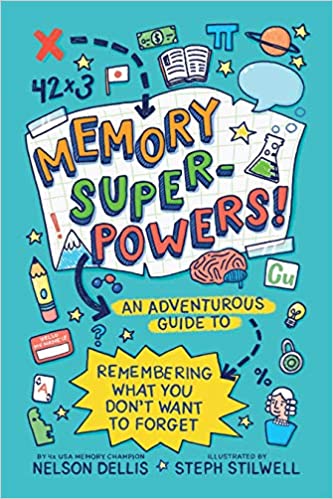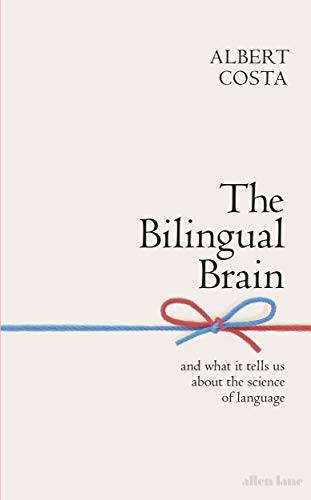
Cheery Friday Greetings to our Learning How to Learners!
Book of the Week
Memory Superpowers!: An Adventurous Guide to Remembering What You Don’t Want to Forget, by Nelson Dellis. It’s probably clear from our many past postings that we’re HUGE Nelson Dellis fans. That’s because four-time US memory champ Nelson isn’t just a memory expert—he’s also one of the best memory teachers in the world. Nelson’s latest fantastic book is geared toward helping teens achieve remarkable memorization skills. If your child is a struggling underachiever, read a little section of this book together each evening so you both can learn how to outwit the Memory Thief. If your child is an overachiever, encourage them read this book on their own so they can achieve still more, all while enjoying adventures in the Forest of Forgettable Names and the Great Word Pyramids, maneuvering around the Pirates of the Periodic Table and journeying through the Himalayan Memory Palace. Nelson notes: “10-14 is the age range (but not limited to that. I mean, lot’s of adults could read it and get a lot out of it. Some advanced readers under 10 could read it too.” Truly a fun and highly practical guide to helping kids achieve remarkable memorization skills.
The Importance of Becoming a Self-Directed Lifelong Learner
This penetrating article by Dr. David Handel, CEO of iDR, is well worth reading. Barb and Terry’s philosophy when it comes to learning is to never take for granted the received wisdom of decades-old theories and stipulations, but instead to go back to first principles in more foundational disciplines such as neuroscience and cognitive psychology and see what derives from there. David’s article goes even more deeply into first principles, meta-learning, meta-thinking, and taking charge of your learning. Incidentally, David is co-Founder of iDoRecall, our very favorite flashcard system.
Supercharge your Pomodoro: How to Stay Focused and Productive During These Challenging Times
With many of us working from home, it can be difficult to stay focused when your usual routine is out the window. This is where our favorite mental tool, the Pomodoro Technique, comes in. Over the past few years, we’ve been following the development of TimeChi. Unlike other Pomodoro timers, TimeChi works by scheduling customized focus cycles by blocking both physical interruptions and digital distractions—and making sure you take regular breaks. TimeChi also helps track your productivity with personalized dashboards, so you can further optimize your work environment for deep work to get the most out of your time. You can get a feel for TimeChi—and preorder if you’d like—at Indiegogo.
A Message from Some of Coursera’s Top Instructors
Here’s an uplifting video from some of Coursera’s top instructors (including Barb!) to help boost your spirits.
An Inspiring Video Story of Dedication to Learning
Veveonah is a 18-year old Malaysian girl who lives at the extremely rural edge of eastern Malaysia in a village named Kampung Sapatalang. She was a freshman student at the university. However, due to the Malaysian Movement Control Order, universities in Malaysia were closed—online became the only mode of delivery in the spring semester. Veveonah found the highest hill near her home and climbed on a tree to get a relatively stable 3G connection. This is where she took her final exams. By the time she completed her exams, it was sunset, and she could only sleep on the tree for that night. She tells (and shows) her story here—watch out for the Asian giant “murder” hornet!
The good news was that, after Veveonah posted her experience on YouTube, the Malaysian Communications and Multimedia Commission responded that the government will take actions to connect rural areas as soon as possible. [This video is a hat tip to our good friend Kenzen Chen of National Chiao-Tung University, who notes: “She is brave, dedicated, and many of her videos amaze me!”]
Interesting Insights on Online Learning
LHTLer Paul Burgmayer has been researching around the web for advice about online learning for students, parents, and teachers. The best advice he’s found for teachers on how to teach is from the Education Endowment Foundation in the UK which in April posted a really nice summary called “Best evidence on supporting students to learn remotely.” It is solid work supported by published research. Their conclusions are not startling but good reminders of what matters most.
Paul continues: “There’s not a lot out there for how to help students learn. The best one I found is part of a blog series by a company called Neo LMS which is part of Cypher Learning. Their newest post is 7 Tips on How to Adapt Teacher-Student Rapport while Teaching Online, which covers a lot of what I’d consider the basics. This article links to a couple of other blogs on the same site which are also helpful. One is on teaching students how to learn which seems related to the Learning How to Learn Coursera course. The other post is about browser extensions that can promote learning by avoiding online distractions and helping facilitate studying.
That’s all for this week. Have a happy week in Learning How to Learn!
Barb, Terry, and the entire Learning How to Learn team
- Get the course recommended text, A Mind for Numbers!
- And Learning How to Learn, a book for kids and parents.
- Follow LHTL on Facebook | Join Barb on LinkedIn | Follow LHTL on Twitter

















